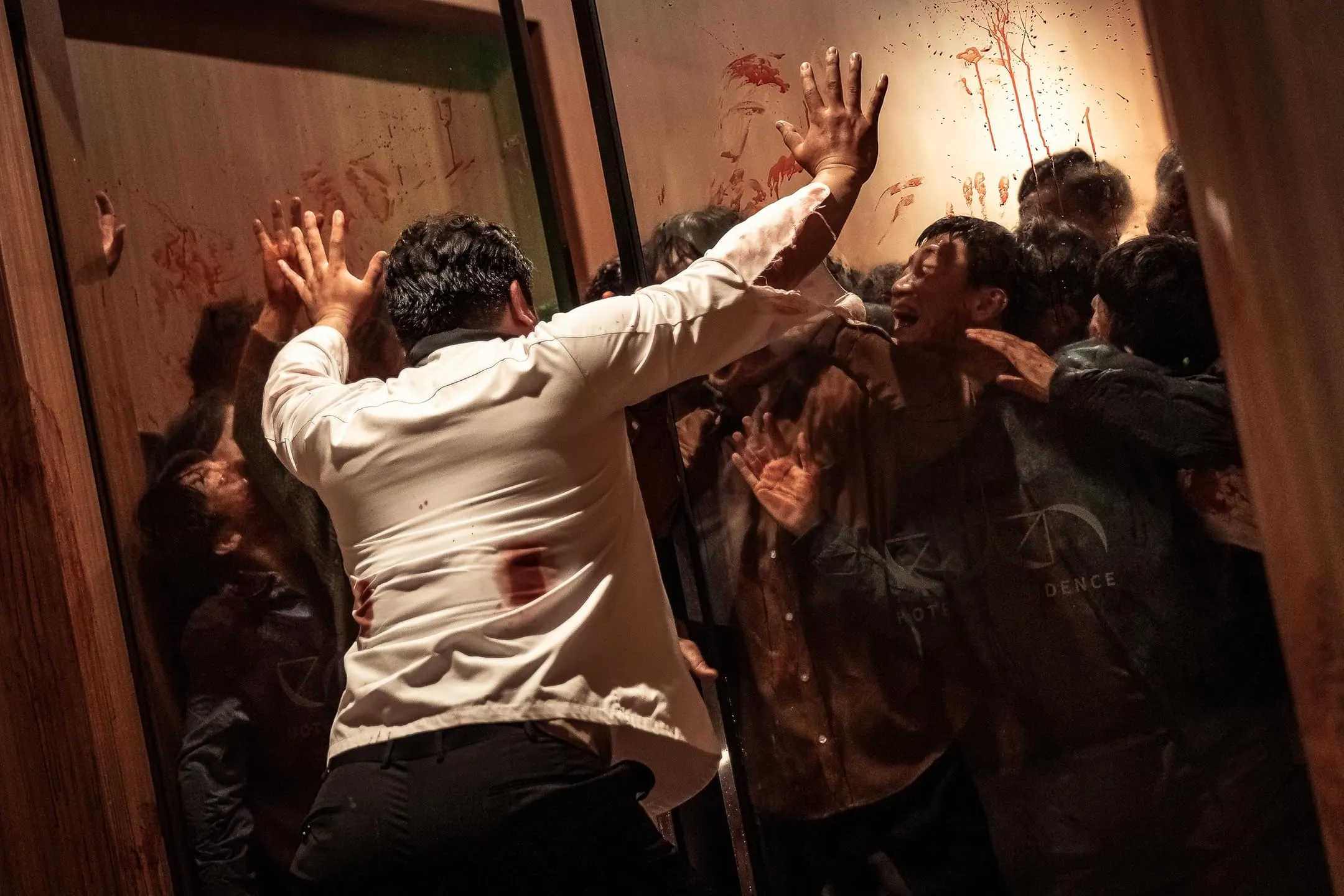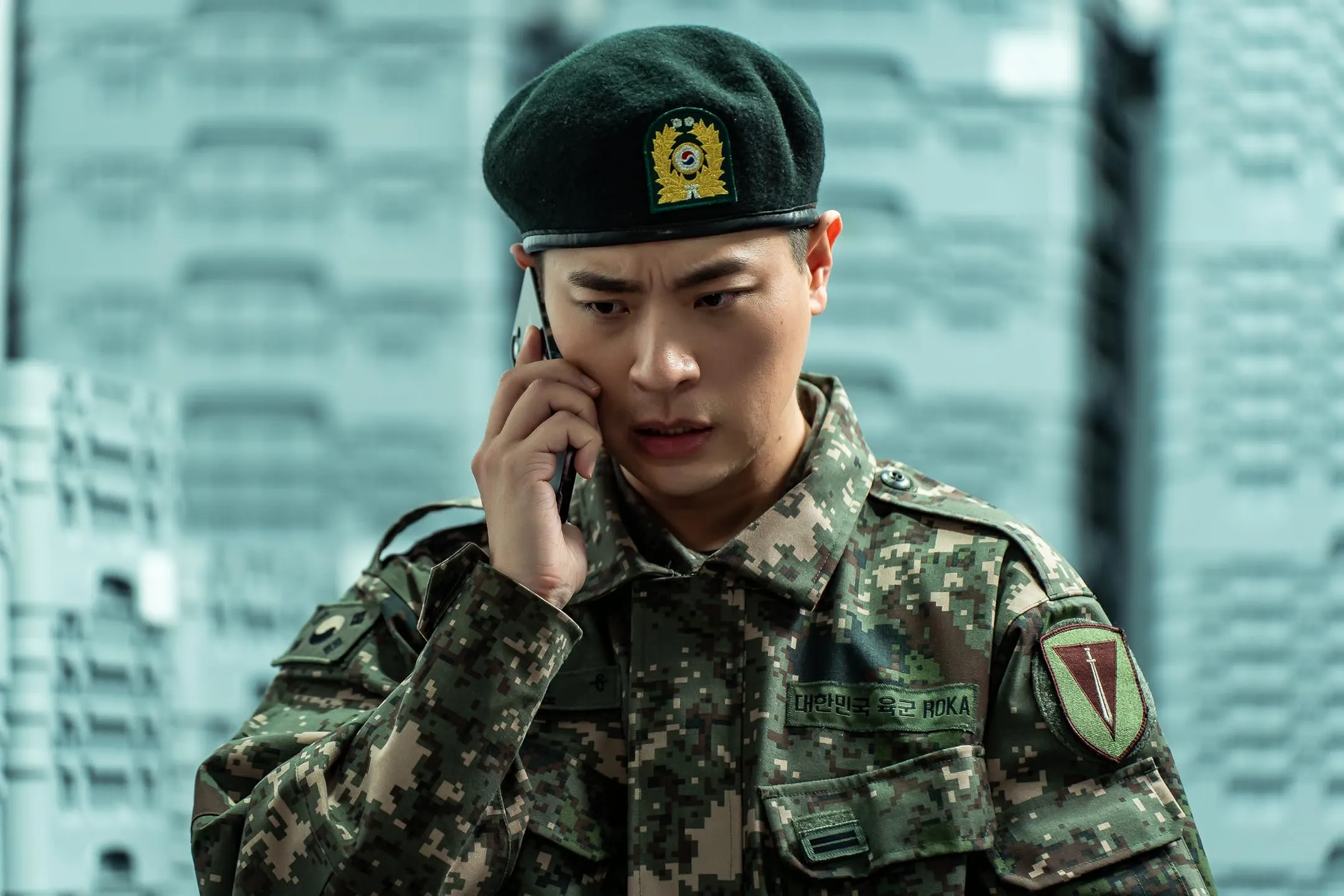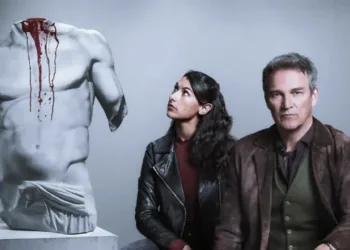At first glance, Newtopia is another addition to the ever-expanding universe of zombie narratives, but it quickly signals its intentions to disrupt expectations. The apocalypse unfolds in the gleaming towers of Seoul, where the undead are only beginning to stir. There’s a certain dissonance in how the show sets up its zombie crisis—rather than the traditional slow burn or gruesome immediacy, it’s presented as a chaotic mess, almost absurd in its simplicity.
What emerges is a striking tonal contradiction, as grotesque creatures claw their way through the world, but the show’s humor rises from the horror like a mischievous specter. It takes an almost farcical approach, leaning into slapstick rather than dread, where the zombies don’t so much terrify as they bewilder.
Yet the true twist lies in the unlikely romance of Jae-yoon and Young-ju, whose relationship—defined by long-distance insecurity and youthful angst—intersects with the deadly new world. As the chaos of the zombie outbreak spins out of control, their emotionally charged but comedically awkward dynamic only deepens the absurdity. Amid the madness, their evolving connection highlights the fragility of human emotions when survival is at stake, blurring the lines between love and desperation.
The Humans Behind the Apocalypse: Character Portraits in Newtopia
Lee Jae-yoon, the bumbling soldier at the heart of Newtopia, is defined by his disarming mix of vulnerability and misplaced bravado. Played with a precision that balances slapstick and pathos by Park Jeong-min, Jae-yoon’s journey into the heart of the chaos is more about his self-perception than the world around him.
A 26-year-old with all the insecurities of someone much younger, Jae-yoon’s protective instincts toward his girlfriend, Young-ju, spiral into near farcical extremes. He’s not a hero in the traditional sense, nor is he entirely a fool. His clumsy militaristic failures—combined with his overbearing worry—make him a tragicomic figure, caught in the absurdity of life before and after the outbreak.
As the series progresses, it’s clear that his evolution isn’t necessarily about becoming braver but rather understanding the humor of his own existence. His humor lies in his inability to break free from the incongruities of his emotional life, something that makes him both frustrating and oddly sympathetic.
In contrast, Kang Young-ju, played by Jisoo, carries a more complex emotional weight. Her journey from disillusionment to something resembling courage is at the core of Newtopia’s exploration of survival—not just physically, but emotionally. She’s the character who starts with all the logical reservations about the future, and yet as the zombie apocalypse unfolds, her emotional world cracks open.
What begins as a comedic portrayal of a frustrated girlfriend—caught between the weight of expectation and the chaos of her own uncertainties—gradually reveals a woman who, like Jae-yoon, must navigate a more surreal and absurd world. Jisoo’s performance blends quiet nuance with moments of sharp comedic timing, creating a character who is equally capable of sardonic humor and moments of profound vulnerability.
Meanwhile, the supporting characters, such as the loyal Ra In-ho and the embattled hotel staff, serve as crucial elements in both the humor and horror of the series. Ra In-ho, played by Im Sung-jae, is a perfect foil to Jae-yoon’s neurotic tendencies, his loyalty and quiet competence grounding the absurdity around them. His humor emerges through his understated reactions to chaos, a balance of deadpan wit and unspoken frustration with the situation.
The hotel staff, notably the disgruntled event manager Oh Soo-jung, portrayed by Hong Seo-hee, contribute a biting humor that serves as a foil to the soldiers’ incompetence. Each of these secondary figures is more than comic relief; they function as mirrors to the protagonists’ disarray, amplifying both the chaos of the zombie apocalypse and the ridiculousness of human nature under duress. The absurdity of their interactions with the oncoming apocalypse creates a strange synergy that both deepens the narrative and heightens the humor.
Laughter Amid the Blood: The Surprising Humor of Newtopia
In Newtopia, the apocalypse is not a terrifying event but an absurd, almost farcical spectacle. The show gleefully upends the usual zombie tropes, turning gore into slapstick, and violence into the punchline of an ongoing joke. At the heart of this dissonance lies a precise balance between the grotesque and the comedic. As characters scramble to survive, the show revels in the ridiculousness of the situation.
A soldier slipping on guts, a helicopter pad turned makeshift obstacle course, and zombies, whose menace is neutered by their ridiculous antics, all play into the irreverent tone that Newtopia wields with sharp intent. It is a world where disaster is paired with comedy, the grimy details of the apocalypse given a cartoonish edge.
Take, for example, the absurdity of Jae-yoon and In-ho’s military training, which becomes a running gag—a demonstration of their incompetence amidst the rising chaos, yet never devoid of humor. It’s in these moments that Newtopia critiques the very nature of survival narratives, twisting their seriousness into something to laugh at.
Yet, the brilliance of Newtopia lies in how it amplifies absurdity in the face of crisis. The stakes are undeniably high—life and death are at play—but the show’s treatment of these stakes mocks the traditional apocalyptic scenario. The exaggerated responses of the characters, such as Young-ju’s frantic handling of a zombie-infested car or Jae-yoon’s panicked attempts at heroism, serve as pointed commentary on the futility of their situation.
Each farcical moment reinforces the show’s broader irreverence toward the genre, pushing against the expected solemnity of apocalyptic storytelling. The humor here is not merely a distraction but an essential tool for undercutting the tension, inviting viewers to question what it means to survive, to love, and to live amid total chaos.
Newtopia takes its time, deliberately easing into the world it builds. The first episode is a slow burn, filled with character-building and the setup of relationships that will eventually be tested by the madness of the outbreak. It’s only in the second episode that the action truly escalates, moving from tentative moments of chaos to full-blown disaster.
This gradual build-up allows the show to play with suspense and anticipation, keeping the audience engaged while still preserving the absurdity that defines it. The delicate balance between comedy and horror is maintained in its episodic structure, ensuring that the humor never fully dissipates even when the zombies are at the door. In doing so, Newtopia manages to create a rhythm where the tension isn’t just in the zombies themselves, but in the characters’ reactions to them, which is where the true comedy lies.
The Art of Chaos: Newtopia’s Visual Tension and Comedic Flourishes
In Newtopia, the apocalypse is as much an aesthetic as it is an event. The visual effects are bold, almost garish in their presentation of gore, yet they serve a purpose far beyond the grotesque. Bloodied limbs and exploding eyeballs become exaggerated, almost cartoonish spectacles—blurring the lines between horror and slapstick.
The chaos of the zombie outbreak is punctuated with the kind of absurdity one might expect from a slapstick comedy. Gory violence, traditionally a harrowing spectacle, here becomes something to chuckle at, as characters contort through ridiculous physical situations or fumble their way through bloody carnage. One can see it in the way the camera lingers on a splattered face or zooms in on a falling body, reveling in the chaos without ever letting the moment sink into terror. It’s as though the visual style itself wants the viewer to notice how absurd the horror is.
Yet the brilliance lies not just in its embrace of slapstick, but in the subtle, almost imperceptible tension the direction creates. Even when humor dominates the scene, there’s a sense of urgency and dread beneath the surface. The camera lingers on moments of near-disaster, elongating the tension just enough to make the punchline hit harder.
This delicate balance—tension stretched taut before breaking into absurdity—is where Newtopia finds its unique rhythm. The visual storytelling amplifies this dynamic, using every shot to keep the audience on edge, only to undercut it with humor at just the right moment. This skillful manipulation of cinematic timing allows the show to maintain its comedic veneer while never fully abandoning the underlying threat of the apocalypse.
Love and Survival: The Emotional Core of Newtopia
At the center of Newtopia lies an unexpected exploration of love in the midst of disaster. The zombie outbreak is, at first glance, a chaotic backdrop to the blossoming, faltering relationship between Jae-yoon and Young-ju. Their romance, built on the familiar terrain of youthful anxiety and insecurities, unravels against the horror surrounding them.
Jae-yoon’s obsessive protectiveness and Young-ju’s growing disillusionment form the emotional foundation of the show. As the apocalypse spirals around them, their struggle to reconnect becomes more than just a plot point—it becomes a meditation on the fragility of relationships under pressure. In the face of zombies and destruction, their efforts to rediscover each other’s emotional truths is an anchor, grounding the chaos in something universally recognizable.
Amid the absurdities of survival, the characters also undergo a quiet evolution. What begins as farcical bumbling—Jae-yoon’s ineptitude, Young-ju’s naive vulnerability—slowly transforms into a more profound journey of personal growth. As they face the terror of the undead and the weight of their own fears, the absurd humor that pervades the series gives way to moments of clarity.
These comedic figures begin to develop resilience, not through exaggerated heroism, but through learning to adapt, grow, and ultimately find courage in the most unlikely of circumstances. It’s through this blend of comedy and crisis that Newtopia draws its emotional depth, highlighting the resilience of the human spirit even when everything around it falls apart.
The Road Ahead: Uncharted Territory for Newtopia
Newtopia stands at a precipice, with its potential lying in the hands of future episodes. While the early chapters have been marked by chaotic humor and slapstick violence, the emotional depth—though promising—remains underdeveloped.
As the series progresses, there’s ample room for the central romance to evolve from its comedic roots into something more poignant, especially as the characters wrestle with the harsh realities of the apocalypse. Equally, the unfolding of the zombie outbreak offers the possibility of unraveling broader societal questions about survival and the fragility of human connection.
The question remains: will Newtopia continue to toy with absurdity, or will it begin to deepen its exploration of the very stakes it has thus far kept at arm’s length? The potential for both humor and heartbreak is rich, waiting to be tapped.
The Review
Newtopia Season 1
Newtopia is a refreshingly irreverent take on the zombie genre, blending slapstick humor and gore with an unlikely romance that navigates the chaos of an apocalypse. While the series shows promise, its emotional depth and narrative development remain underexplored in the early episodes. With room to grow, particularly in its character arcs and the evolution of the zombie crisis, Newtopia holds potential for a more engaging and layered story. For now, it offers a light, chaotic ride—an absurd but enjoyable blend of horror and humor.
PROS
- Unique blend of humor and zombie horror.
- Strong performances, especially from the lead actors.
- Refreshing take on the zombie genre, avoiding conventional tropes.
CONS
- Emotional and narrative depth is underdeveloped in early episodes.
- Pacing can be slow, especially in the first episode.
- The balance between comedy and horror may not appeal to all viewers.




















































